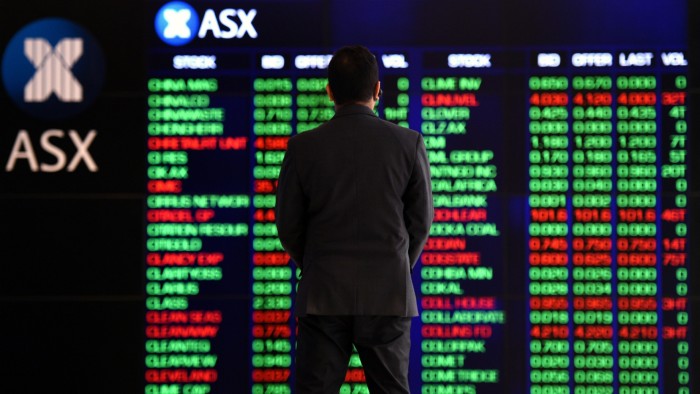Australian ETF market is maturing despite ‘gimmicks’, study says

Simply sign up to the Exchange traded funds myFT Digest -- delivered directly to your inbox.
Latest news on ETFs
Visit our ETF Hub to find out more and to explore our in-depth data and comparison tools
Australia’s exchange traded fund market “is becoming more entrenched and diversified”, though the large number of ETFs available may mean the priority “will now be consolidation of assets in existing products”, according to a new report from Cerulli Associates.
The global research group says in its latest Cerulli Edge: Asian Monthly Product Trends report that there were 304 ETFs listed in Australia as of the end of September and that new products are being launched “even in difficult market conditions”.
According to Cerulli, “the diversity of the market has proven useful in difficult markets because it is now sufficiently sophisticated to offer much more than purely long-only options”.
The research group cited the example of leveraged short funds, “which would not have existed in the sector’s early days” and that were the best-performing products in September.

This article was previously published by Ignites Asia, a title owned by the FT Group.
In other months, certain specialist commodity ETFs showed strong performance, such as a global uranium ETF in August.
Cerulli says the momentum in Australia’s ETF industry is “extremely promising, even if there is a sense that new product launches are becoming so niche as to be gimmicky”.
The report notes that ETF providers have been launching niche products, though some products have been losing money and others have even delisted.
It refers to the cryptocurrency ETFs that launched to great fanfare in May but have been delisted due to low investor demand.
Local digital asset manager Cosmos Asset Management delisted its three crypto ETFs in early November, and two ETFs that invested in units of the Toronto-listed 3iQ CoinShares Bitcoin and 3iQ CoinShares Ether ETFs also stopped trading last month.
The report also warns that “with so many products now available, perhaps the priority will now be consolidation of assets in existing products rather than to always launch something new”.
Cerulli notes the Australian ETF market was still heavily dominated by equity strategies.
The research group cites data from Morningstar showing that while equity ETF assets dropped “dramatically” from $67.2bn at the end of last year to $58.5bn as of the end of September, these vehicles still managed more money than all other asset classes put together.
Overall Aussie ETF assets fell from nearly $87bn at the end of 2021 to $74.5bn at the end of September.
Equity ETFs accounted for $9.7bn of the $11.6bn of net inflows posted by Australian ETFs in the first three quarters of 2022.
Cerulli notes that it was “striking that alternative inflows have dropped away very sharply, while money market products have turned sharply negative — an interesting situation given that rising rates are providing higher returns on cash than has been the case for many years.
“Instead, it appears investors are finally returning to fixed income as yields rise significantly for the first time in a decade.”
Net flows into fixed-income ETFs in the first nine months of this year reached nearly $1.6 billion, close to 2021’s full-year total of $1.7bn.
*Ignites Asia is a news service published by FT Specialist for professionals working in the asset management industry. It covers everything from new product launches to regulations and industry trends. Trials and subscriptions are available at ignitesasia.com.

Click here to visit the ETF Hub
Comments